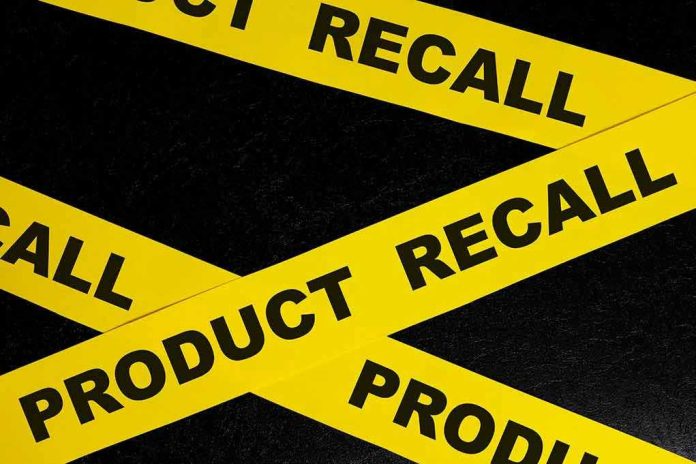
When you can’t even trust a classic American snack to be labeled correctly, you know the wheels are coming off the bus—and this latest Ritz Peanut Butter Cracker recall over a packaging blunder is a perfect snapshot of the bureaucratic mess that’s infecting every corner of our daily lives.
At a Glance
- Ritz Peanut Butter Cracker Sandwiches recalled after peanut butter varieties were mislabeled as cheese, posing a serious risk to those with peanut allergies.
- The recall affects four popular Ritz configurations with specific best-by dates, but no other Ritz or Mondelēz products.
- No illnesses have been reported, but the recall is a precautionary response to a supplier packaging error.
- The incident spotlights ongoing failures in supply chain oversight and the critical importance of accurate food labeling.
Peanut Panic: The Cracker Catastrophe Nobody Asked For
Mondelēz International, the snack food giant behind Ritz, has just pulled four different peanut butter cracker sandwich products off shelves nationwide after discovering that, thanks to a supplier’s error, some packets labeled as “cheese” actually contained—you guessed it—peanut butter. For anyone with a peanut allergy, this isn’t just a labeling mix-up; it’s a potentially deadly mistake, and all because the wrong packaging film got slapped on the wrong snack. The cartons were labeled correctly, but the individually wrapped crackers inside were a roll of the dice. Because apparently, in 2025, you need X-ray vision just to enjoy a snack without risking your life.
This isn’t the first time the American public has been let down by slipshod quality control and government “oversight” that’s about as effective as a screen door on a submarine. It’s another reminder that, while bureaucrats love to regulate every aspect of your life, somehow they can’t keep a simple snack label straight. And let’s not forget: accurate allergen labeling isn’t just a “nice to have”—it’s the law, enforced by the FDA, which swooped in the moment Mondelēz waved the white flag and announced a recall. But the damage to consumer trust is already done, and the bigwigs at Mondelēz are putting on their best “concerned” faces for the press, assuring us all that “corrective actions” are underway. Color us reassured.
Who’s to Blame and Who Pays the Price?
If you’re hoping for accountability, don’t hold your breath. Mondelēz says this is all because of a “supplier error”—those mysterious third parties that always seem to vanish into the fog when there’s a problem. The FDA, meanwhile, gets to flex its regulatory muscles after the fact, issuing sternly worded notices and patting itself on the back for “protecting the public.” The real losers? The American families who have to double- and triple-check every snack their kids eat, just to avoid a trip to the ER. And the retailers? They’re yanking products, scrambling to warn customers, and fielding angry calls. But the ones who really feel the pinch are the allergy sufferers who—through no fault of their own—have to live in constant vigilance because our food supply is apparently being managed by the Keystone Cops.
Meanwhile, this is just the latest in a string of food recalls over undeclared allergens—each one a glaring example of how industry “best practices” and “strict regulations” are only as good as the people enforcing them. We’re told that the recall is “precautionary” and that “no illnesses have been reported.” Well, that’s a miracle, but it’s a miracle that shouldn’t have to happen in the first place. If you’re a company that rakes in billions selling snacks, maybe—just maybe—you could spend a few bucks to make sure your peanut butter crackers aren’t getting wrapped in cheese labels. But in an era when common sense is rarer than a government balanced budget, here we are.
The Bigger Picture: When Regulation Fails, Families Suffer
This isn’t just a story about crackers; it’s a story about a system that’s grown so bloated and distracted by political correctness and virtue signaling that it can’t even deliver on its most basic promises: safety, transparency, and accountability. While government agencies obsess over woke initiatives and throw taxpayer money at every passing fad, the nuts-and-bolts business of protecting American consumers gets lost in the shuffle. That’s how you end up with a food industry that can’t keep peanuts away from people who are allergic to them—even when it’s literally printed on the box.
And what’s the corporate response? The usual parade of press releases, hand-wringing, and promises that this time, they’ll get it right. Sure. Until the next “supplier error.” Until the next recall. Until the next family ends up in the ER because nobody in the chain of command bothered to check the labels. Maybe if American families were treated with the same level of care and urgency that’s lavished on special interest groups and illegal aliens, we wouldn’t be having this conversation. But as long as the people in charge are more interested in appearances than outcomes, don’t expect things to change any time soon.







